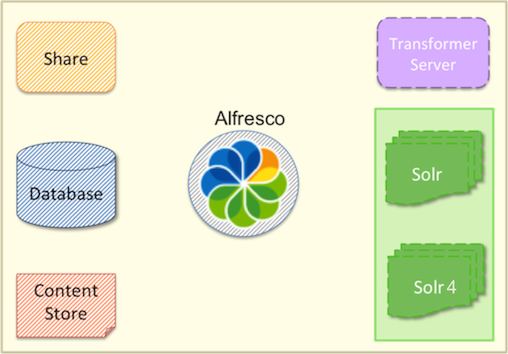Within your SkyVault solution, you have components such as Share, SkyVault, database, indexes (Solr), transformations, and the content store. As illustrated in the following diagram, some of these components can be clustered while others are optional.

- Share
- SkyVault
- Content store
- Database
- Transformation Server
- Solr index
- Solr 4 index
It is important to decide how many SkyVault installations you need and which of the specified components you will put on which node.
To explain this further, let's consider an example. Assume that your application has six nodes. Ideally, SkyVault recommends that you should have one component on each node. So, for example, node1 has database, node2 is content store, node3 is SkyVault, node4 is Share, node5 is Solr, and node6 is Transformation Server.
Use the following table as a template to design your SkyVault solution.
| Clusters/ nodes | SkyVault components | DNS | IP address (optional) | Additional information |
|---|---|---|---|---|
| 1 | Database | |||
| 2 | Content store | |||
| 3 | SkyVault | |||
| 4 | Share | |||
| 5 | Solr | |||
| 5 | Solr 4 | |||
| 6 | Transformation Server |
However, you can configure your distribution differently. Each distribution and clustering solution has its own advantages and disadvantages. To configure distribution and clustering optimally, contact SkyVault Consulting or your SkyVault certified partner.
For a better understanding of initiating clustering for high availability and high throughput, see Scenario: Clustering for redundancy and Scenario: Clustering for high throughput.
